The bitter legal battle to salvage Koh Poda
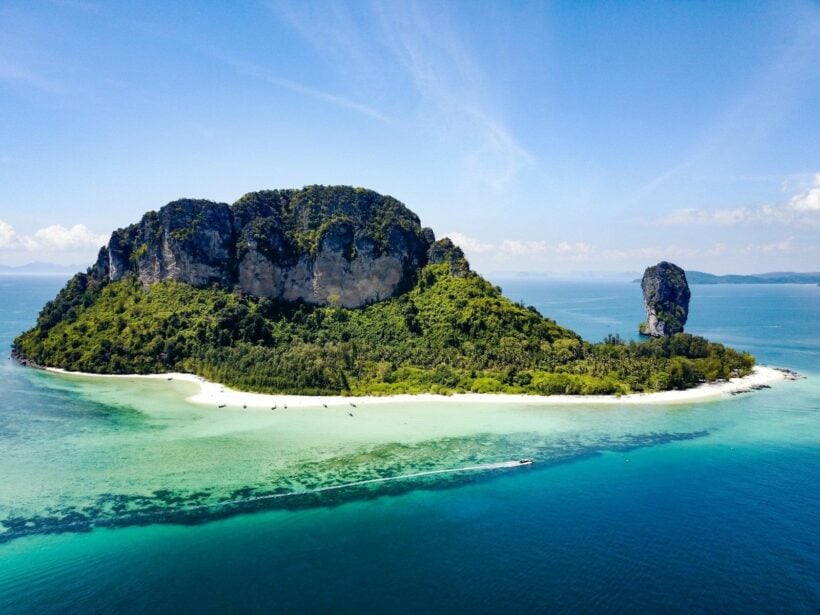
by Piyaporn Wongruang – The Nation Weekend (12 minute read)
Worapoj Lomlim could barely sleep days before the Krabi provincial court was set to read the verdict of the Court of Appeals Region 8 on a land dispute over Poda, the renowned island.
“It was epic. I just anxiously waited and hoped to win the case,” said Worapoj, recalling last week’s court session, which saw the National Parks, Wildlife, and Plant Conservation Department (DNP) that he represented to win a counter civil lawsuit filed against it by major Krabi business tycoon Chuan Phukaoluan.
The land conflict over Poda has been full of twists and turns in the legal fight between the two parties, having battled through almost all possible courts, 10 out of 12 so far, over 33 years. It all began in 1985 when park officials first learned that the island under its supervision had an owner. The case demonstrated once again the painstaking task of seizing state land once a land title deed is issued through the troublesome land occupation claim form, Sor Khor 1.
There are an estimated 4.5 million forms that are improperly registered now.
“You can see that the process [to take the land back] is not easy at all,” DNP chief Thanya Netithammakul conceded during the press conference.
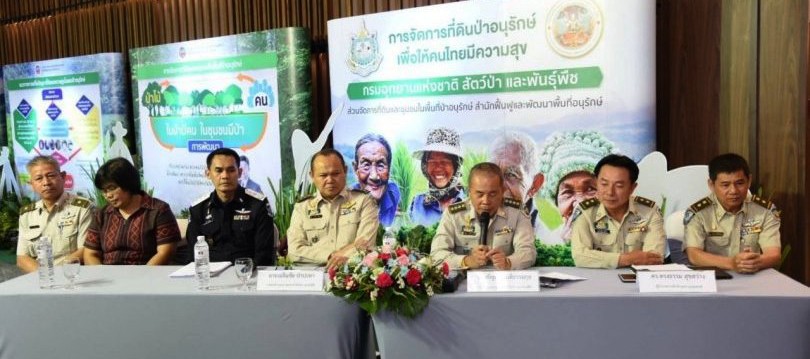
Contesting claims
Situated in the Andaman, Poda was among some splendid tropical islands, beaches, and bays, including the famous Phi Phi, which in 1983 were designated as part of the Had Nopparat Tara-Mu Koh Phi Phi National Park. The chief at that time started to survey the territories under his supervision and decided two years later (in 1985) that a forest protection unit be constructed on Poda, which had around 71 rai of the eastern beachfront.
However, he learned later that some construction workers were working on a site on the island, assigned by business tycoon Chuan. According to the DNP’s summary report of the case and the 2011 Supreme Court’s verdict on a civil lawsuit filed by the DNP against Chuan, the chief then checked land ownership on Poda with the Krabi province office. The district office replied that the land use rights deed, or Nor Sor 3 Kor, No 750 was issued for around 50 rai of the contested land plot based on the document Sor Khor 1, No 2. This was around two months or so after the designation of the park. The land owner at that time, Ma Rhob, then divided up the plot into four deeds. They were eventually sold to Chuan in 1985. The Sor Khor 1, No 2 stated that the land it covered was located in Moo 3 (village 3), a point that would be critically contested by the concerned parties.
The chief then conducted ground checks via the oldest satellite photographs taken in February 1967 (16 years before the park designation) and learned that plot of land at the time did not have any signs of land use or farm practices, suggesting that it was a forest. So, he informed Krabi province to revoke the separate Nor Sor 3 Kor deeds, but the province refused to do so.He then informed his department – the Royal Forestry Department at that time – which later set up a sub-panel to investigate the case.
It later concluded that the issuance of those deeds would likely be unlawful and informed the chief to contact the Krabi governor to revoke the deeds. The governor, however, refused to do so. So, the department took the case to court, filing a civil lawsuit against the business tycoon in 2000 (17 years after the park designation), asking the court to revoke the deeds and ordering the defendant to move out from the island.The First Court in 2003 ruled in favour of the department, ordering the deeds to be revoked and the defendant to leave the land.
The Appeals Court Region 8 in 2006 then upheld the first court’s verdict. The case then went to the Supreme Court. It was revealed later that the address stated as Moo 3 on the Sor Khor 1, No 2 was not Poda. Poda was Moo 2, and that the state of the village was never changed in the state’s administrative registration, the court pointed out. In addition, the court investigated the condition of the contested land. Based on the satellite photographs provided, the court opined that there were no signs of land use or farm practices as claimed by the defendant.
Coconut trees, the key contesting evidence, if grown in the years before 1955 (one year after the 1954 Land Codes requiring land owners to register their land occupation) by the first owners of the land and Ma Rhob himself, should have been 12 years old and tall enough by the time to be captured in the oldest satellite photographs.
“The issue to be ruled in this case, is whether the land upon which the defendant is constructing buildings and growing coconut trees, is the plot of land with lawfully issued Nor Sor 3 Kor…
“Convincingly, the plot of land under the Sor Khor 1, No 2 was not on Poda. The Nor Sor 3 Kor deeds issued out of it were therefore not legitimate, and the plot of land on Poda upon which the buildings were built and coconut trees grown was therefore a plot with unlawful Nor Sor 3 Kor,” the Supreme Court ruled, upholding the first two courts’ verdict and ending a 11-year stand-off since the case was first filed in 2000.
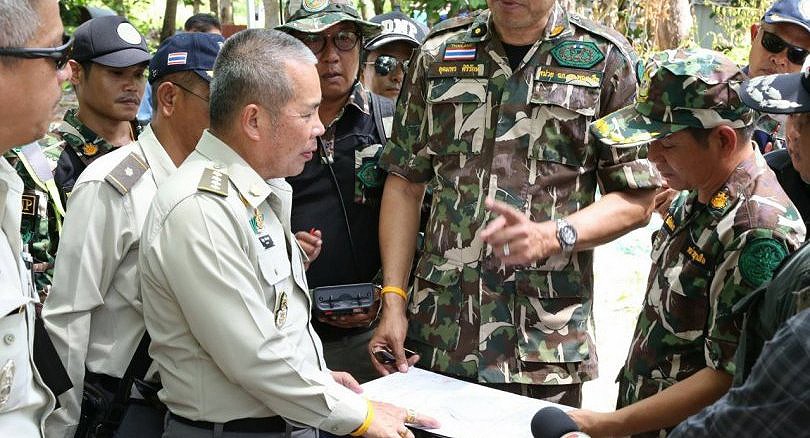
Thanya instructed Phaya Suea during the inspection on the island last year.
Fierce encounter
After the Supreme Court’s ruling in 2011, the DNP, which replaced the Royal Forestry Department during the course of the court’s deliberations, planned to remove all the properties out of the land plot, but faced fierce opposition from the business tycoon. In 2013, the Krabi Land Office revoked all the deeds, but still Chuan refused to leave the land. In February that year, the court issued a legal execution against him. He then appealed against it when the department sent its rangers to put a sign on the land plot, but the court enforced the legal execution.
At least 35 buildings were earmarked for removal, along with one large restaurant, and a 100-metre fence. The DNP, however, learned later that the business tycoon had laid another claim over the rest of the beachfront, around 21 rai, this time with the document Sor Khor 1, No 1 that he claimed to have bought from some other land owners in 1986 (a year after the purchase of the Nor Sor 3 Kor deeds out of the Sor Khor 1, No 2).
He claimed that the land under the Sor Khor 1, No 1 was actually 70 rai and further north next to that under the Sor Khor 1, No 2, creating confusion about where the new additional area he claimed was from. A fence was put up around the newly claimed 21-rai land plot and a new building was built. The DNP in May 2014 decided to raid the property and file a criminal charge for trespass against the tycoon.
The business tycoon, meanwhile, retaliated with a similar criminal lawsuit against the DNP. He also filed a new civil lawsuit against the DNP in 2015, further dragging the issue into the legal quagmire.
Unfinished business
The First Court deliberated on the DNP’s criminal lawsuit against the tycoon and decided to dismiss the case against the tycoon. It also dismissed the criminal case filed by tycoon against the DNP. However, the Appeals Court, following an appeal by the DNP, heard the criminal case and issued the verdict in February this year (four years after the case filing). It overturned the first court’s verdict, ruling that the tycoon was guilty.
Chuan was sentenced to three and a half years in jail, and he and his workers ordered to leave the land. According to the verdict of the Appeals Court in February, the court referred to the Supreme Court’s verdict in the first civil lawsuit, citing Poda was Moo 2, not Moo 3 as also stated in the Sor Khor 1, No 1. It also learned from the evidence submitted that Chuan had attempted to seek a land title deed for around 51 rai of the land using Sor Khor 1, No 1, in 2010, when the Supreme Court was still deliberating on the DNP’s civil lawsuit against him. He conceded that most of the land for which he had sought a title deed overlapped the area under the Supreme Court’s deliberation.
The park officials, meanwhile, learned that some other part of the land encroached further inland on the park’s forest, and opposed Chuan’s proposal.
Still, in 2013, two years after the Supreme Court’s verdict, the business tycoon facilitated a survey by Krabi Land officials for issuance of the land deed, a point the court suggested revealed his intention to claim the state land. It therefore ruled that he was guilty. Having lost in the criminal Appeals Court, Chuan, however, did not give up. Although he did not pursue the criminal case he had filed against the DNP, the tycoon, however, continues to pursue the civil lawsuit it.
The First Court in July last year ruled in favour of Chuan, ordering the DNP to leave the new controversial land. The Appeals Court, however, ruled in favour of the DNP last week, citing the Supreme Court’s first civil lawsuit verdict that Poda was Moo 2, not Moo 3 as stated on both Sor Khor 1, No 1 and No 2. The court also viewed that it was impossible that there was land further north to that under the Sor Khor 1, No 2, as the document stated that its northern and southern sides were seas.
During the court deliberations, the DNP’s working group, including its Phaya Suea taskforce, and representatives from the Department of Special Investigation and the Agriculture Department, also gathered and submitted additional evidence, including the newly assessed ages of coconut trees, which were found to be much younger than the claim by the tycoon that they dated back to 1955.
Considering related land laws as well as satellite photographs, the court ruled that the contested land was indeed state land. “…The found facts reveal both controversial plots of land are state land,” stated the court, dismissing the case and ordering the plaintiff to pay around 900,000 baht for legal expenses. Wirat Kalyasiri, a prominent lawyer for Chuan, told the Nation Weekend that the legal team is studying issues in the court verdicts, and would take its civil lawsuit to the Supreme Court, and counter the DNP’s criminal lawsuit to the end.
The legal team has sought more time to file an appeal in the criminal charge, he added. As for the criminal lawsuit that his client has filed against the DNP, it was likely that his client would not pursue it further in the Appeals Court. Thanya, meanwhile, is just hoping they would not carry on the legal battle, and Poda would eventually return to the public, as it should, in the next 30 days.
“It’s a historic victory that we have won with the integrated work of various agencies, which actively cooperated with one another to bring back natural resources that belong to the state, not an individual,” said Thanya, adding the work would be applied to other court cases that the department is fighting now.
A Side story: Troublesome Sor Khor 1
The Koh Poda court cases have demonstrated once again the painstaking task in seizing state land once a land title deed is issued through the troublesome land occupation claim form, Sor Khor 1. Realising the problem with the Sor Khor 1, the now-defunct National Reform Steering Assembly (NRSA) even tried to solve it by proposing legal and policy amendments when it was in the office two years ago. In consultation with the Lands Department, the NRSA learned that around 4.25 million land occupation forms, or Sor Khor 1, which are used as proof for the issuance of land-deed documents, have not yet been stamped and approved by the Lands Department’s clearance system.
The enormous backlog shocked some members of the committee expediting forest reforms under the NRSA, including Assistant Professor Khwanchai Duangsathaporn, as they realised just one such document could enable the “grabbing” of an enormous area of forest if abused.
To issue land deeds, a Sor Khor 1 is a form to start with. It can be transferred from one place to another or become a tool for ill-intentioned people to grab land. The committee flagged the issue as part of its six immediate recommendations to forest reform. A Sor Khor 1 has long been pinpointed as a major cause of deforestation in false claims on land ownership, often in forestland. This is because boundaries shown in a Sor Khor 1 are usually rough, with descriptions referring only to adjacent areas, which can also apply to other places, such as streams, seas, rivers, and others. Since Thailand issued land ownership documents to private entities following the land law in 1954, land owners were required to report their land occupation to land officials and they would receive a Sor Khor 1 form in return, which would be used to issue permanent land deeds later.
In 2008, the government tried to put them in order and end the mess by requiring people possessing Sor Khor 1 forms to turn them into land deeds within two years, or they must request a court order to do so afterwards. But, there are still 4.25 million stuck in the process, causing a huge official headache. According to Khwanchai, the committee has proposed some legal and policy changes in regard to a Sor Khor 1.
Firstly, the land law must be amended to pave the way for other agencies to get involved at the request of a court, rather than the Lands Department alone. And to make such a request, the Sor Khor 1 owners must prove that they not only possess the land, but also use it.
Secondly, there should be a new Cabinet resolution instructing the department to make copies of the 4.25 million Sor Khor 1 documents for verification. And, new provincial land committees should be set up to check and verify Sor Khor 1 deeds already converted into land deeds and kept at provincial land offices nationwide.
As cited by Khwanchai, the committee focused particularly on the plots close to state land, especially forest areas, because they are prone to encroachment via the process. It had requested for those already converted to land deeds be verified, but that number was not yet known. Legal enactment for concerned forest laws to seize assets gained by such fraudulent acts was proposed.
A new sub-panel directly investigating natural resources cases under the National Anti-Corruption Commission was also suggested. Khwanchai said the plan has now been incorporated in the new natural resources reform plan, which would be subject to the first review in September. Some legal amendments are now with the Interior Ministry, which supervises the Lands Department, Khwanchai said, citing Poda as the case that had cast the spotlight on the need for amendments as it has once again demonstrated a critical problem resulting from a Sor Khor 1 form.
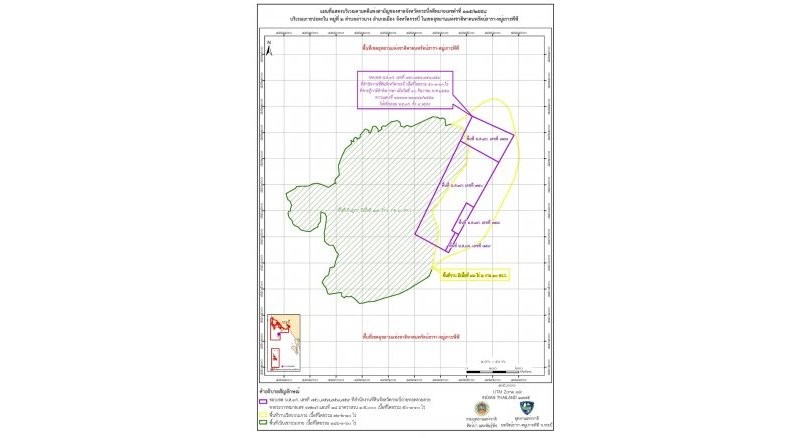
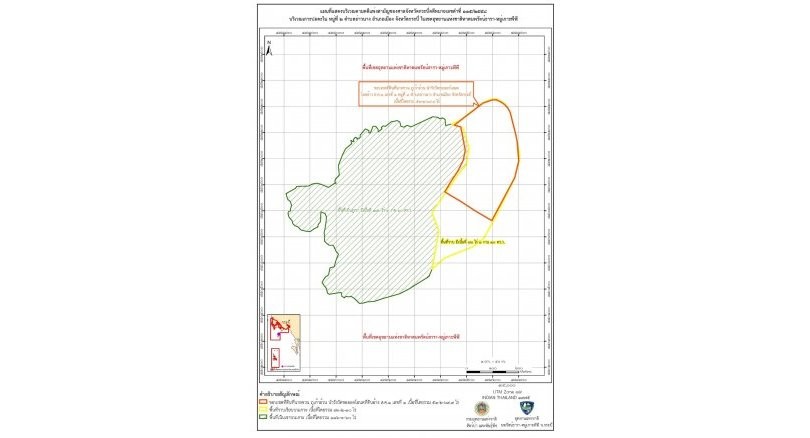
STORY: The Nation Weekend
Latest Thailand News
Follow The Thaiger on Google News:


























